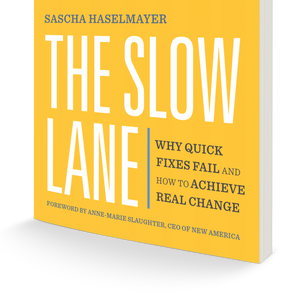Late last year, Simon Köhl and I had a public conversation as part of Ashoka's Welcome Change series to talk about how we can build inclusive, enabling technology for learning in a Fast Lane world. Yesterday, Forbes published a version of our conversation about Serlo, the organization he co-founded, that reveals valuable insights for how the Slow Lane uses technology as an enabler (Slow Lane Principle #5).
"At the end of the day, the private sector is incentivized to differentiate students by economic class. It is not really interested in a well-funded, innovative public school system, serving a holistic public service, because it takes away from their market."
I wrote about Simon's story in The Slow Lane book because it shows what can happen if you build a big technology platform (Serlo is used by more than one million students in Germany every month) to specifically address inequality in classrooms, instead of feeding competition among students. Serlo was built by Simon and his friends when they were still in high-school, in part because he was very aware of the privilege that private tutoring gave him to make his way through school. It is hard to imagine that Simon, an incredibly eloquent and successful Slow Lane leader and Ashoka Fellow, struggled at school himself.
Simon delivers a poignant critique of the current school system in Germany, which, by contrast to other countries, remains mostly public. According to Simon, success in school often depends on how wealthy the school district is and whether a family can afford private tutoring. For him, the biggest problem is that adults decide what and how young people should learn. School turns young people into passive consumers of information, instead of strengthening their capacity to solve challenges on their own, to guide their own learning. And those are the skills we most need, in a fast changing world.
"I saw ... how the school system produces inequality, with many young people not getting the support they need. So my friends and I built Serlo. It offers lessons, exercises, videos, and other content in the manner of Wikipedia, completely free of charge."
Serlo was built by students with a different vision of how the classroom should work. Simon and his friends (and now over 100 volunteers) envisioned a classroom, in which students can learn at their own pace. With Serlo, itself inspired by Wikipedia, teachers, instead of hammering knowledge into young heads, become facilitators who hold the space for students to direct their own learning. In recent developments, Serlo and the German government announced that the platform would be integrated into Germany's national digital learning infrastructure. That will put Serlo at the fingertips of all teachers, who now access the content and tools, and become contributors to the high-quality learning content on Serlo.

Like other Slow Lane movements, Serlo is competing against a Fast Lane world where technology talent is highly prized, and where businesses try to defund public education and get wealthy parents to spend more on private tutoring. But in Simon's experience, at least for now, highly talented programmers are attracted to work at Serlo even for just half the salary they could get in a commercial startup. In his view, more great people want to have a positive impact and at Serlo they can get co-ownership in the cooperative and work in a truly purposeful and inclusive mission.
"Nobody told us we weren’t experienced enough, that we didn't have the capital or the network to reach our target audience. I think this shows what young people really want and need: to pursue their ideas without judgment."
Simon and his friends built Serlo when they were still in high school. In hindsight, he thinks that this allowed them to try something big, without adult intervention. There was no startup program to help them, to force them to think about business models or how hard it might be to retain tech talent. Instead, his group imagined what would be best for all students, especially those of lesser means. Serlo, as a result, is a beautiful example of how technology can be an enabler in the Slow Lane, and how it can allow young people with no formal powers, to work up the courage to try something big that challenges the prevailing, broken power structures in our education system. Whether as users, creators, or contributors to Serlo, young people and adults experience agency every time they interact with the platform.
You can read our full conversation on Forbes.



